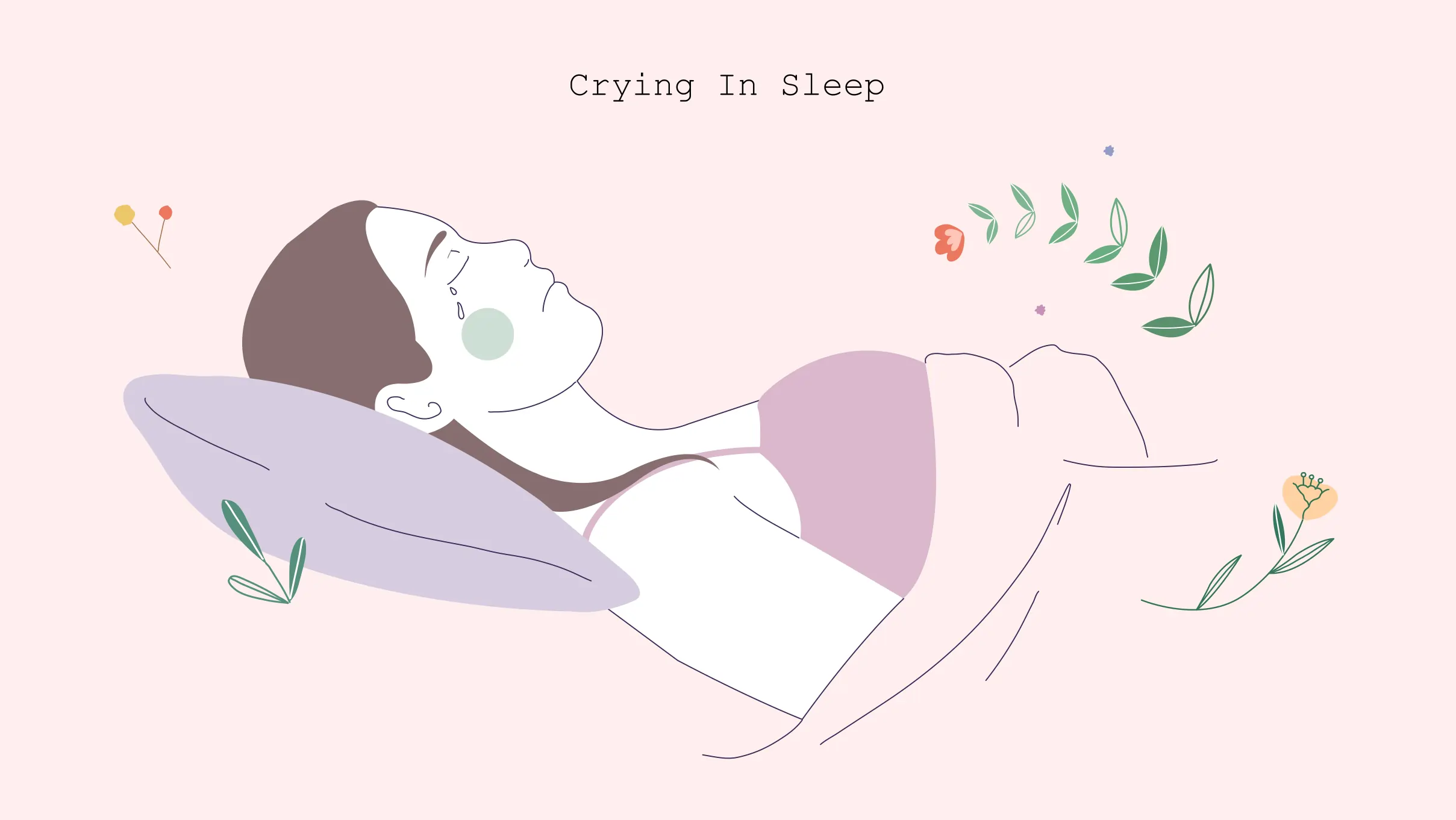Crying in Sleep: Know the Causes & Solutions
Written by


Sleep is considered a happy and peaceful time during which our body and brain reset and rejuvenates. That is why we wake up fresh the following day. But did you ever witness someone crying in sleep and waking up traumatised?
Infants crying in sleep is a common phenomenon and nothing to worry about. But it is concerning when an adult does that. Adult crying is a sleep disruption caused by any physical and psychological condition that triggers a nightmare.
The entire experience is highly confusing and distressing. In this write-up, we understand what does it mean when you cry in sleep, what causes it, and how to best deal with it. Stay touted!
Why Do People Cry in Their Sleep?
When we sleep, our body rests, but our brain remains active. Moreover, while we can suppress our emotions when awake, they tend to break loose when we sleep. It triggers intense dreams, nightmares, sleep terrors and other such dreadful experiences during our REM sleeping phase. All these strong, overwhelming emotions make us cry at night. But, more often than not, we might not remember it when awake.
But many times, you may also find yourself waking up crying from a dream, sleepwalking, or finding it difficult to fall asleep again.
If you are crying in sleep, it need not be a cause of alarm. But its frequent occurrence is concerning and can be understood better through a polysomnogram or sleep study, where the brain-wave activity is monitored and studied.
Sleep-Crying in Seniors
The causes of sleep crying vary with age. For instance, why do babies cry in their sleep? They often cry when transiting from deep sleep to a lighter stage of deep sleep. But why do seniors cry?
A leading reason for sleep-crying in seniors is dementia. However, the culprit can also be the overwhelming emotional stress they experience during the day.
Physical ailments like arthritis and other emotional and physical conditions might cause seniors to cry in their sleep.
What Causes Crying in Your Sleep?
Crying in sleep can be triggered due to several reasons. Let’s walk through a few of them.
1. Night Terrors
Night terrors are more common in children between the age of 4 and 12. But it can happen in adults as well, primarily because of trauma.
While nightmares occur during the REM stage of sleep, night terrors occur during the non-REM stage of sleep. It might even run in families.
Amidst a night terror, a person screams, shouts, kicks, and thrashes. When they wake up from it suddenly, they are confused, stare wide-eyed, have dilated pupils, sweat profusely, have a racing pulse, and breathe heavily. The person might even exhibit aggressive behaviour and can sleepwalk.
However, the person does not recall anything about it in the morning. The entire experience is terrifying, though not dangerous.
2. Emotional Dreams
Crying in sleep can also be triggered by an awful or unfortunate event that has taken place in your life, like the demise of a loved one, getting fired from a job, and so on.
These events can cause a strong emotional dream where your sadness and frustration manifest. Hence, you might cry in your sleep. But because you do not remember such a dream, you might be surprised to see tears in your eyes while waking up.
3. Suppressed Emotions
Sometimes, you have emotions like anger, depression, etc., that you do not deal with when awake. You just suppress them and pretend as if they do not exist. But you cannot control them when sleeping. They can manifest as bed dreams and make you cry at night.
4. Medication
Certain medications can cause disturbing dreams and nightmares that can leave you crying in sleep.
5. You Are Experiencing Nightmares
Nightmares happen more at a young age than in older adults. It can occur if you are experiencing intense emotional turmoil like a traumatic experience, incident or happening in your life. Examples include experiencing horrible war conditions, getting raped, witnessing a murder, etc.
6. You Are Depressed
Depression often builds up a feeling of sadness and despair inside you. It does not stem from any specific situation but takes a more holistic picture of your life and future dreams. If things are looking gloomy, then you become depressed and might end up crying in sleep.
7. You Have Parasomnia
Parasomnia refers to sleep-related disorders. It includes several sleep disorders like REM sleep behaviour disorder, sleepwalking, aggressive behaviour during sleep, etc. It could be genetically induced or triggered by a series of unfortunate experiences in your life. Due to it, you are often waking up crying from a dream.
8. You Are Stressed
Stress and anxiety are other common causes of crying in sleep. They trigger intense emotions, depression, and other mood changes that cause bad dreams and hence, you cry at night.
When Should You Worry?
Usually, a cry at night is temporary and not a cause of concern. But it needs medical therapy and proper attention if you notice any of the following symptoms.
It Happens Frequently
You might cry in your sleep one odd time. It is normal and nothing to be worried about. But if it happens almost every night or too frequently, it needs medical intervention and therapeutic help.
You’ve Recently Had a Traumatic Experience
An intense psychological, emotional or physical trauma can leave you highly strung, traumatized, and with too many unresolved and negative feelings. They typically manifest as anger, depression, crying in sleep, etc. The expert help of a counsellor or psychologist is the best arsenal to resolve it.
You’ve Recently Suffered a Head Injury
A head injury can easily impact your brain waves, changing how your brain works. It can lead to strange behaviour and thoughts which would otherwise have been alien to the normal you. One of its impacts is waking up crying from a sleep.
You Have Other Symptoms
Sometimes, you might suddenly find your physical and mental condition changing and manifest as warning signs like night terrors, crying in sleep, insomnia, sleep apnoea, unusual and unexplained irritability, extreme fatigue, body pains and aches, etc.
These are highly concerning, especially if any of these are not part and parcel of your life. A thorough medical examination and proper treatment is the best way to resolve the problem.
You’ve Recently Changed Meds
We already know that some medications can cause night terrors and cry in sleep. Some of them include antidepressants and beta blockers, a medication most older people consume. Likewise, antihistamines and even sleep-inducing medicines can cause crying in sleep.
You might need to consult your doctor if you experience sleep-crying due to a recently introduced medicine.
It Disrupts Your Sleep
Sleep crying is highly concerning if it interrupts your restful sleep to such an extent that you are almost afraid to sleep and get tensed about the prospect of sleeping.
Suppose you are getting interrupted and disturbed sleep due to nightmares, which severely impacts your physical and mental health. In that case, medical help is a must on a priority basis. It will help exorcise the trauma triggering the sleep cry almost every night.
How to Stop Crying During Your Sleep?
Crying during your sleep can have significant adverse effects if it is too frequent. Fortunately, you can adopt several tips to tackle and combat it if it does not have a severe medical background. Let’s check them out.
1. Meditation
A cry at night stems more from emotional disturbance than physical. Meditation is perhaps one of the best ways to calm and de-stress your mind and body. Moreover, it helps you fall asleep faster and promotes more restful and restorative sleep, eliminating potential crying at night.
2. Stress Management Activities
Stress is part and parcel of our lives. We tackle it effortlessly if it is within acceptable limits. But you need to resort to a few stress management activities if it causes disturbed sleep and crying in sleep. Deep breathing techniques are a shining example of it.
3. Sleep Hypnosis
Sleep hypnosis is an excellent way to face your deepest disturbing emotions and tackle them correctly. It also relaxes you and induces better sleep. It could be executed by an in-person or a recorded session.
4. Seek Out Professional Help
If sleep crying is too frequent and is highly disruptive to your sleep, you need professional help.
They can best identify the root cause and then provide treatment to eliminate it in the best possible manner.
Conclusion
Deep and restorative sleep is the key to performing to your maximum capacity and leading a satisfying life. Hence, you should address crying in sleep through various lifestyle, diet, and other changes before it becomes severe.
FAQs
Why is my dog crying in his sleep?
Dreams happen during REM sleep, also known as rapid eye movement sleep. Your dog may “act out” their dreams during this stage of sleep by moving its legs or paws, growling, making faces, whimpering, or crying.
Is it normal to cry in your sleep?
Although crying while you sleep is common, you shouldn’t ignore it. Adults who have experienced a traumatic event might go through this. And to aid in the healing process, they might want to seek counselling.
Why did I cry in my sleep and woke up crying?
Nightmares, sleep terrors, and even crying while dreaming can cause you to cry while asleep. For the latter, this feeling frequently arises when the dreamer has an intense dream that feels real.
Why is my baby crying in his sleep?
If your baby cries while sleeping, it might just signal that they’re moving on to the next stage of the sleep cycle. They frequently return to their previous state, but occasionally the change causes them to awaken.
people like this article
Written by








